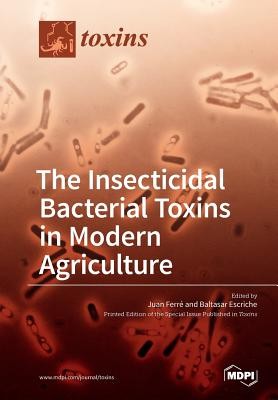
- We will send in 10–14 business days.
- Publisher: MDPI AG
- ISBN-10: 3038426628
- ISBN-13: 9783038426622
- Format: 17 x 24.4 x 1.1 cm, minkšti viršeliai
- Language: English
- SAVE -10% with code: EXTRA
The Insecticidal Bacterial Toxins in Modern Agriculture (e-book) (used book) | bookbook.eu
Reviews
Description
Increased awareness about environmental adverse effects of human activities has prompted the use of insecticides with low impact on systems associated to agriculture. Currently, the most successful biological products are based on protein toxins from the bacterial species Bacillus thuringiensis. Because of the remarkable properties of these proteins, their encoding genes were introduced into farming species (the so called Bt-crops), in such a way, that these plants are self-protected against some key insect pests. Despite the fact that a relatively large number of these toxins, with different toxicity ranges, have been described, it is still important to find new resources with novel capabilities to complement, or to replace in the future, the currently used ones. On another hand, it is important to continue studying their mode action in susceptible insects, and the changes occurred in resistant ones, to determine the most effective strategy for long lasting pest control. The focus of this Special Issue of Toxins is to provide updated information on the use of B. thuringiensis and their toxins on different field crops, the interactions of these toxins with other molecules, analyze the biochemical and molecular basis of emerging cases of resistance and, in general, to provide information which can contribute to an effective pest management with these toxins.
EXTRA 10 % discount with code: EXTRA
The promotion ends in 23d.16:38:59
The discount code is valid when purchasing from 10 €. Discounts do not stack.
- Publisher: MDPI AG
- ISBN-10: 3038426628
- ISBN-13: 9783038426622
- Format: 17 x 24.4 x 1.1 cm, minkšti viršeliai
- Language: English English
Increased awareness about environmental adverse effects of human activities has prompted the use of insecticides with low impact on systems associated to agriculture. Currently, the most successful biological products are based on protein toxins from the bacterial species Bacillus thuringiensis. Because of the remarkable properties of these proteins, their encoding genes were introduced into farming species (the so called Bt-crops), in such a way, that these plants are self-protected against some key insect pests. Despite the fact that a relatively large number of these toxins, with different toxicity ranges, have been described, it is still important to find new resources with novel capabilities to complement, or to replace in the future, the currently used ones. On another hand, it is important to continue studying their mode action in susceptible insects, and the changes occurred in resistant ones, to determine the most effective strategy for long lasting pest control. The focus of this Special Issue of Toxins is to provide updated information on the use of B. thuringiensis and their toxins on different field crops, the interactions of these toxins with other molecules, analyze the biochemical and molecular basis of emerging cases of resistance and, in general, to provide information which can contribute to an effective pest management with these toxins.


Reviews